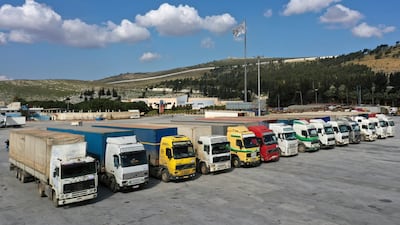The UAE's ambassador to the UN, Lana Nusseibeh, urged the Security Council on Thursday to renew authorisation for the delivery of life-saving aid to north-western Syria, through Turkey.
With the current mandate due to expire on July 10, Ms Nusseibeh said the international community has a “moral responsibility” to put humanitarian duty above any political considerations.
“As we approach the end of the mandate for the cross-border aid mechanism … we stress the need to extend this mechanism for 12 months based on humanitarian principles and immense needs,” she told the Security Council.
UN aid chief Martin Griffiths also pushed for an extension.
“A 12-month authorisation enables us and our partners to deliver better humanitarian outcomes in the months ahead. It is as simple as that,” Mr Griffiths said.
The UN can deliver aid to Syria through only one border crossing, at Bab Al Hawa in Turkey. The arrangement is enforced by Russia, a veto-holding Security Council permanent member.
Russia, an ally of Syria, has long questioned the need for the aid operation, saying more humanitarian assistance should be delivered to the area from within Syria.
“Aid should not be used as a bargaining chip by any of the obstructive parties on the ground, and all parties must also ensure appropriate conditions for the passage of humanitarian convoys,” said Ms Nusseibeh.
According to the UN, more than 15.3 million Syrians are dependent on humanitarian aid to survive, including 4.1 million people living in the north-west.
The situation was made more dire after February's devastating earthquakes that struck parts of Turkey and Syria.
Russia's UN ambassador Vassily Nebenzya said that the UN aid operation breached the sovereignty and territorial integrity of Syria.
On June 8, US Secretary of State Antony Blinken and the Gulf Co-operation Council issued a joint statement welcoming UN Secretary General Antonio Guterres's call for a 12-month renewal of the cross-border corridor.
The International Committee of the Red Cross's head of advocacy, Amanda Sweeney, said the discussion at the Security Council should be about expanding, not decreasing, humanitarian access.
“In the immediate aftermath of the earthquake, the one remaining UNSC-authorised crossing point, Bab Al Hawa, was out of operation due to destroyed roads used to transport aid, highlighting the risk of having just one formal crossing for the UN,” Ms Sweeney said in a statement.


